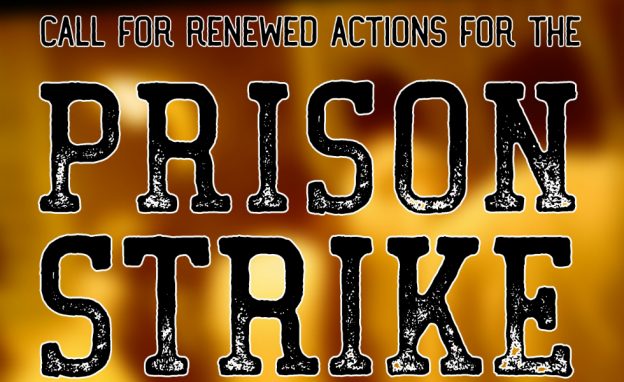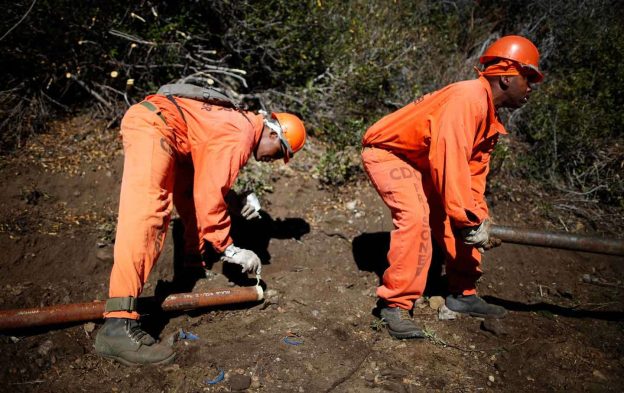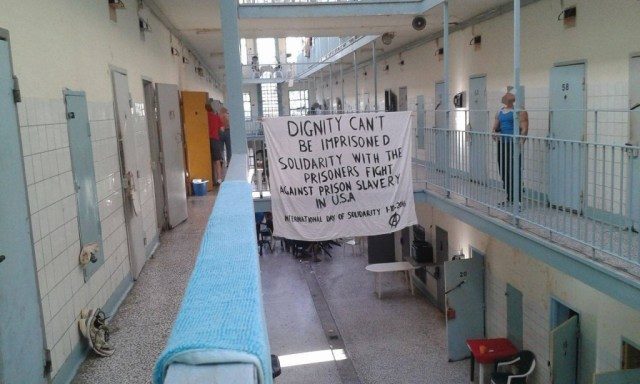 Get up-to-date information and action suggestions. Continue reading
Get up-to-date information and action suggestions. Continue reading
Tag Archives: solidarity
New Zine on International Solidarity
A new zine cataloging international solidarity actions has been added to the resources page, and here. Print it off and send it to your comrades on the inside!
full Text:
From the Cages in Greece: Solidarity With Striking Prisoners

Call for Renewed Actions in Solidarity With the Prison Strike, October 15-22
From It’s Going Down
It hardly seems necessary to summarize what has gone down inside U.S. prisons since September 9th. Hunger strikes, work stoppages, and riots have spread throughout the country on a scale that we likely aren’t even fully aware of yet. Some uprisings appeared took us by surprise, such as in several Florida prisons, while others presumably grew from recent organizing endeavors on the inside, such as at Kinross in Michigan or Holman in Alabama. By rough estimates, over 20,000 prisoners were involved in some way. That’s huge.
On the outside, solidarity burned so brightly all over the world. Banner drops, graffiti slogans, noise demonstrations and more showed that we had the backs of all who would partake in the strike. It is worth noting however that the vast majority of this took place the first weekend of the strike. But this prison strike—and the struggle against prisons more broadly—is about more than a day or a week. It didn’t start on September 9th and it isn’t ending any time soon. Some prisoners may return to work while others decide to stop working for the first time. It’s easier when there is a definitive date to take action on, to build momentum towards, but that’s not going to be enough.
Therefore, we would like to offer a call for renewed actions in solidarity with the prison strike and the struggle against prison society. Right now many are organizing anti-repression campaigns for striking prisoners and that is of course very necessary and not nearly as exciting work. But it would be a mistake to conceive of this struggle in a linear fashion—that is to say, a single wave where we demonstrate as it crests and write letters as it crashes. How many prisoners hadn’t heard about the strike until after it had started? How many knew but didn’t think people would actually be there to support them? Three weeks after the start of the strike, inmates in Turbeville, South Carolina rebelled against a guard and took over their dorm. How can we stop while inmates are still risking their lives for freedom? Continue reading
Message from Menard Illinois
A prisoner in Menard Illinois wrote this in response to a noise demo outside of the prison on September 9th.
“Last week we heard the love outside. No doubt we gave it back. They sent a few police up here and around on other wings to quiet the noise, but it was already said and done. We really appreciate the love. It’s always appreciated.”
International call for solidarity campaign for us prisoners on 1 October
 This is a call for a concerted solidarity campaign for the struggle of us prisoners on 1 October
This is a call for a concerted solidarity campaign for the struggle of us prisoners on 1 October
In solidarity
Abc-solidarity cell ( Athens,Greece)
Prisons in the usa – The dark side of slavery in american society
In order to be in the position to understand the importance and necessity of the us prisoners’ struggle, we first need to analyze the role of slavery in the foundation and evolution of the american state and its historical and integral ,until today, link with the capital.
Slavery in its many forms was actually the foundation on which the omnipotence of american overlordship was gradually built. The root of this phenomenon can be traced back in the era when the christian empires of europe started a race to conquest unknown lands, founding colonialism regimes, in the era of brutal genocides of the indigenous populations and the slave trade of the non-white african population.
Letter of support from Quebec prisoners on strike, September 9
From Prison Radio Show
The letter reads:
A Letter in Support of Prisoners in the US who are striking against prison slavery
First, we want to tell you that you are not alone! We are keeping our eyes on your struggles. We support you!
In your call for a strike on September 9th you evoke the uprising in Attica that began on September 9, 1971. You write about ending prison slavery by ceasing to be slaves yourselves. We see you. We hear you. We support you.
We are a group of people, some in prison, some not in prison, and some who are in between. We are critical of the prison system and all its trappings. We would like to share with you some stories of our struggles. Continue reading

This Week May See the Largest Prison Strike in US History
From The Nation / John Washington
Across 24 states, inmates are sick of poisoned water, solitary confinement, and forced labor.
This September 9, we may witness the largest prison strike in US history. Potentially thousands of inmates across both state and federal prisons in as many as 24 states plan to engage in a coordinated strike and protest in an attempt to bring attention to the daily injustice of their lives. The strikers are calling for an end to “slave-like” working conditions, illegal reprisals, and inhumane living conditions.
Planned for the 45th anniversary of the Attica Prison uprising, the actions of September 9 will shed light on the often decrepit conditions suffered by the 2.4 million people in what is the largest carceral system in the world. They will also mark a new point in the fight against mass incarceration, and likely stand as a harbinger for further actions and strikes to come. Malik Washington, an inmate in the H. H. Coffield Unit in Texas and the chief spokesperson for the End Prison Slavery in Texas movement, wrote to me in a letter: “Prisoners in Amerikan prisons are sick and tired of being degraded, dehumanized, and exploited.”
Building a Movement Behind Bars
The September action didn’t come out of nowhere. Siddique Abdullah Hasan, an inmate in Ohio State Penitentiary and a member of the Free Ohio Movement, describes it as just the latest part of “an ongoing resistance movement” that has seen increasing numbers of work strikes, hunger strikes, and protests hitting prisons across the country in the past decade. Back in 2010, inmates in at least six different state prisons in Georgia staged a labor strike, protesting prison conditions and lack of remuneration for their forced labor. Continue reading
September 9th PDX Teach-in, March & Noise Demo (2-8pm)
Find the facebook event here.
2PM: Teach-in at Chapman Square
3PM: March to Prison Profiteers
6PM: Reconvene at Champman for a Noise Demo @ the Justice Center (across the street from Chapman Square)
On Friday, September 9th, people across Portland and Northwest will converge in Downtown Portland in solidarity with the US wide prison work strike against prison slavery and white supremacy. Our goal is a mass showing of support with the growing prison rebellion in the US and to also march on the corporations in the Downtown area that make massive profits off of prisoner enslavement.
Slavery is legal in America. Written into the 13th Amendment, it is legal to work someone that is incarcerated for free or almost free. Since the civil war, tens of millions of people most arrested for non-violent offenses, have been used as slaves for the sake of generating massive profits for multi-national corporations and the US government. Today, prison labor is a multi-billion dollar industry which helps generate enormous wealth for key industries such as fossil fuels, fast food, telecommunications, technology, the US military, and everyday house hold products.
The strike, which starts officially on September 9th, the 45th anniversary of the Attica Uprising, is historic. The strike is being led by groups such as the Free Alabama Movement, Free Texas Movement, Free Ohio Movement, Free Virginia Movement, Free Mississippi Movement, and many more. Prisoners have asked that supporters hold noise demonstrations outside jails and prisons, protest, disrupt, and demonstrate outside of corporations that profit from prison labor, and also support the strike that is happening across the US. Continue reading
While There Is A Soul In Prison
By Colin Bossen
Note: I recently have become involved with the Industrial Workers of the World’s Incarcerated Workers Organizing Committee. I am serving as their contact person for faith-based organizing. It is a volunteer role and one of things that I am doing as part of it is preaching some in support of the September 9, 2016 National Prisoner Strike. The following sermon was the first I preached in support of the movement. I presented it at the First Parish in Needham, Unitarian Universalist, on August 28, 2016.
It is a pleasure to be with you this morning. Your congregation features prominently in one of my favorite books of contemporary Unitarian Universalist theology, A House for Hope. John Buehrens, your former minister and the co-author of that book, has something to do with me being here today. He was a strong advocate for youth ministry when he was the President of the Unitarian Universalist Association. I had the good fortune to meet him when I was sixteen. He encouraged me both along my path to the ministry and my path to the academy. I also have fond memories of the worship services your present minister Catie Scudera led during her time at Harvard. And I congratulate in calling someone who will no doubt be one of the guiding lights of the next generation of Unitarian Universalists. So, there is a strange way in which even though I have never spent a Sunday with you before I feel as if I already know you a little.
Such familiarity, I suspect, is rather one sided. Most, of maybe all, just know me as the guest preacher. The last in the long line of summer preachers trying to bring a little spirit to Sunday morning before your regular worship services resume next month.
Now me, I am something of circuit rider. Right now I preach at more than a dozen congregations a year while I am finishing up my PhD at Harvard. As I travel around I have the privilege of getting something of the breadth of our Unitarian Universalist tradition. I think since I started in the ministry more than a decade ago I have lead worship at close to a hundred Unitarian Universalist congregations in the United States, Canada and the United Kingdom. Those congregations include the some of the largest and some of the smallest in our tradition.
My peripatetic career causes me to divide Unitarian Universalism crudely into two wings: the liberal and the abolitionist. Unitarian Universalism is occasionally called a liberal religion. This label refers to our understanding of human nature. Historically we have understood human beings to contain within them, in the words of William Ellery Channing, “the likeness to God.” As contemporary Unitarian Universalist theologian Rebecca Parker has explained, this does not mean that we think human beings are necessarily godlike. Instead, it suggests that rather than being born innately flawed or depraved, as orthodox Christianity has long taught, we are born with the capacity to choose and to become. Reflecting upon the suffering that we inflict upon each other Parker writes, “We are the cause and we can be the cure.” In this sense liberal religion means a recognition that much of what is wrong in the world was wrought by human hands. By joining our hands and hearts together we can, and we do, heal much of that harm.
I am not thinking of the liberal religion of Channing when I say that Unitarian Universalism can be crudely divided into two wings. I suspect that if you are here this Sunday morning your view of human nature is at somewhat similar to Channing’s and Rebecca Parker’s. Whether politically you are a Democrat or a Republican, an anarchist or a socialist, a liberal, libertarian or a conservative, if you are a Unitarian Universalist are a liberal religionist.
My division of our community into the abolitionists and the liberals focuses on our attitudes towards social reform. The majority liberal tradition believes in incremental and pragmatic social change. The social institutions and practices that exist, exist. When confronted with the intractable problems of America’s justice system liberals think the key question is: how can we make this system work better for everyone? How can we ensure that police are not racist? That everyone gets a fair trial and that prisons are humane? Continue reading

